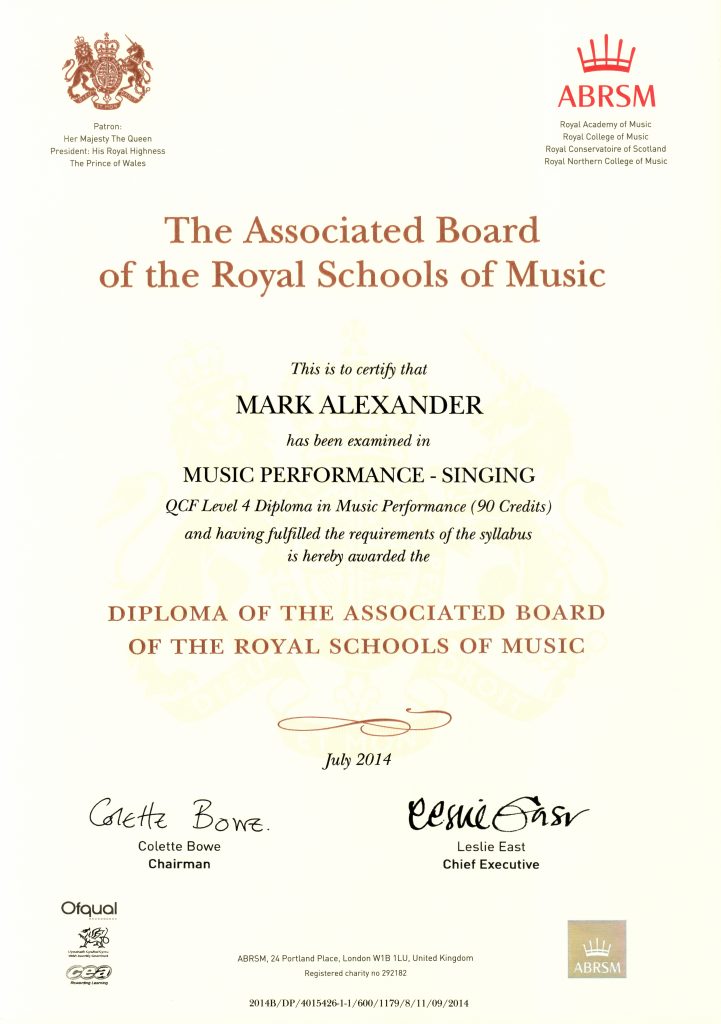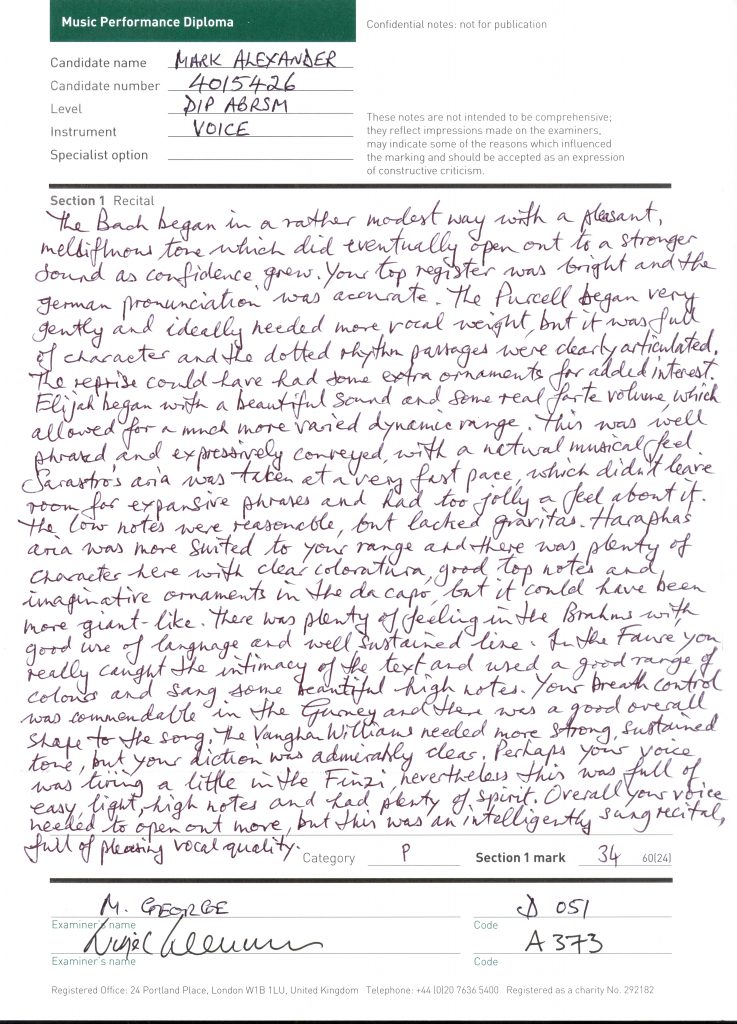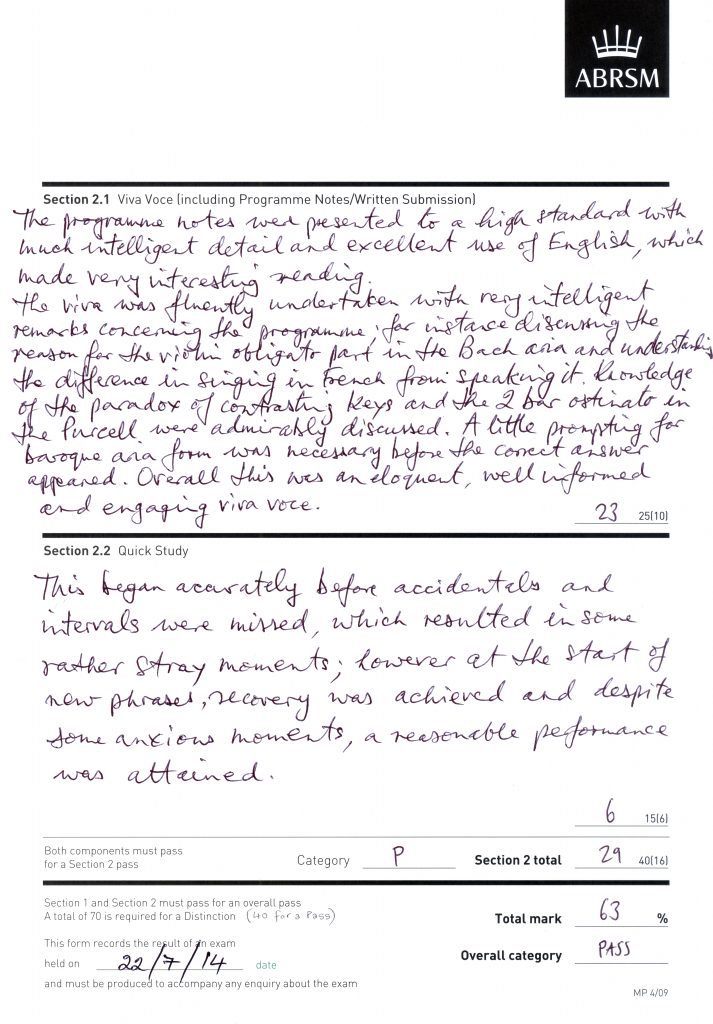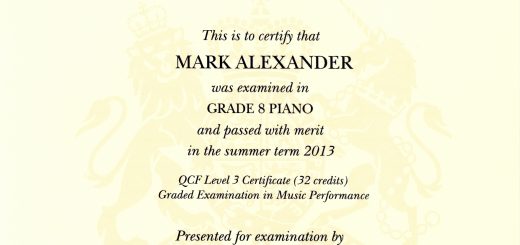Mark awarded DipABRSM – Singing Diploma in Prison
Mark studied for his Diploma in Music Performance (DipABRSM, rebranded as ARSM in 2024) whilst in prison, achieving a Merit. He was the first person to have ever attempted an exam at this level in prison. On a sunny afternoon in July, two examiners from the Royal Schools of Music traveled up to Leicester to hear him deliver a 35 minute recital in the prison Chapel, before quizzing him in a viva voce. We’ve gathered together a copy of his programme from that memorable day, as well as some of the songs he performed. Mark has since gone on to study for and be awarded his LRSM.
I’d always wanted to do this at school, but never had the time. Now time stretched invitingly before me like an open road. Embarking on this in a prison was always a bit of a punt, but to actually pull it off was a real thrill. Finding a source of focus in a place like this is so important, you need some space to decompress a little. This was technical challenge for me, but also a feat of escapism. For a moment, I would be transported away through the songs of each composer.
Prisons are pretty dehumanising places at the best of times. Music restored some much needed dignity and humanity in an otherwise vapid and insipid environment. I realised that, with hard work and determination, the barriers that hemmed me in needn’t be limiting. It set me on a course to achieve as much as I possibly could whilst stuck inside



Ivor Gurney – Severn Meadows, Exhibited at the Royal Festival Hall in September 2014
This song is a rare example of Gurney setting one of his own poems to music. Written in the trenches in March 1917 – aged 26 – Gurney was able to contrast the horrors of war on the front line against the beauty of England’s rolling landscape, thereby transcending his existence through verse. He longed for Gloucestershire and “the rightness of a former day” when he would take ‘The Dorothy’ out to sail on the River Severn with a close friend. The song is dedicated to another Dorothy, whom he met at the Royal College of Music. Gurney was shot in the shoulder a month after writing this piece. His work was later championed by Gerald Finzi.
Gabriel Fauré – ‘Adieu’, No. 3 from ‘Poème d’un Jour’ Exhibited at the Royal Festival Hall in September 2015
Following a chance encounter (“rencontre”) with a “gentle passer by”, this mélodie comes at the end of a three-part song cycle about one man’s fleeting love interest. Grandmougin’s versification is typical of popular women’s magazines of the day, and Fauré makes light of this saccharine prose. The ever-changing style of accompaniment, from gentle crotchets to hurried triplets, reflects the lover’s fickle interest as he feigns regret over their parting. A brief transition to E minor while he imparts hollow words of sadness is quickly gotten over. This rather deft, if not manipulative, exit strategy is prophetic of Fauré’s own dalliances with women. The song is dedicated to the host of one of Paris’ famous salons, which Fauré often frequented.
Mozart – Aria: ‘In diesen heil’gen hallen’ from ‘Die Zauberflöte’, Act 2
In this aria, the magician Sarastro reassures Pamina that he has no desire for revenge against her mother – his antithesis – the Queen of the Night. Instead he advocates forgiveness and brotherhood, acting as an agent for spiritual development along the path to enlightenment. The political significance of this didactic opera would not have been lost on its audience, fresh from the 30 Years’ War. Sarastro points the way to “a better land”, typifying public interest in reform across the Austrian Empire. The aria is steeped in Masonic symbolism, and numerology pervades both structure and verse. The balanced phrasing and simple harmonic vocabulary are highly distinctive of the Classical period and give a strong sense of narrative. Mozart died 3 months after this opera premiered.
Gerald Finzi – ‘It was a lover and his lass’, No. 5 from ‘Let us Garlands Bring’
Dedicated to Vaughan Williams for his 70th birthday, this folk-song is the last in a cycle of five that took Finzi over 10 years to complete. The sensitive word-setting, intricate rhythms, changing time signatures, and syncopation are characteristic of Finzi’s style, with a nod to Vaughan Williams’ use of the flattened seventh. The Shakespearian verse is taken from Act 5, Scene 3 of ‘As You Like It’, in which Touchstone calls on a page to sing to him in the Forest of Arden – a pastoral paradise. Having fallen in love with a country girl, Touchstone has made peace with the rustic life he previously tired of – much as Finzi did in 1933.
Mendellsohn – Aria: ‘Lord God of Abraham’ from ‘Elijah’, Part 1
Mendelssohn was a Classicist with an inclination for Romanticism. He revived Bach’s ‘St Matthew Passion’ in 1829, in the face of great opposition. Having been exposed to the likes of Goethe and Hegel as a child, Mendelssohn deplored the prevailing extravagance and frivolity of the time and saw music as “heil’ge Kunst” (a sacred art). Like Handel, Mendelssohn felt most at home in England where his work was best appreciated. Mendelssohn had contemplated an ‘Elijah’ as early as 1836 after the premiere of ‘St Paul’. In Christian doctrine Elijah points the way to Christ, the fulfillment of Jewish prophecy. The opening recitative – from 1 Kings 18:30 – sets the scene for Elijah, who takes his turn to pray over the sacrifice on Mount Carmel. The oratorio emulates the spirit of Bach and Handel.
14.7 DipABRSM Programme





Your Thoughts